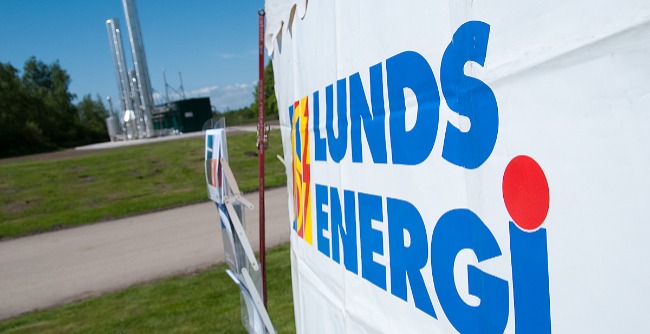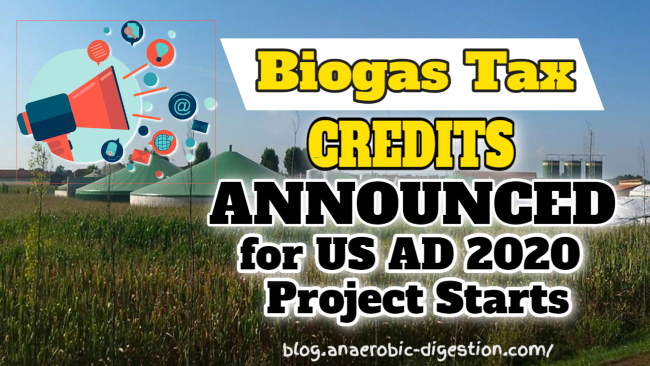Biogas Tax Credits have now been available since 2020 when this new subsidy support for the US was passed by Congress for Anaerobic Digestion (AD) projects which started development in 2020. So, at last! The US seems now to have started on the road toward reducing the imbalance in automatic tax subsidies still paid to the oil, coal and gas industries.
Biogas Tax Credits Available for US AD Projects
In the United States, there are tax incentives available for businesses and individuals who invest in AD projects. Here are some of the tax credits available for US AD projects:
Investment Tax Credit (ITC)
The Investment Tax Credit (ITC) allows taxpayers to deduct a portion of the cost of an AD project from their federal taxes. The ITC is currently set at 26% for projects that begin construction before the end of 2022. The credit will decrease to 22% for projects that begin construction before the end of 2023.
Production Tax Credit (PTC)
The Production Tax Credit (PTC) provides a per-kilowatt-hour credit for the first ten years of an AD project's operation. The credit amount is adjusted annually for inflation and is currently set at 1.8 cents per kilowatt-hour for projects that begin construction before the end of 2021.
Renewable Energy Credits (RECs)
Renewable Energy Credits (RECs) are certificates that represent the environmental benefits of generating renewable energy. RECs can be sold to utilities and other entities to help them meet renewable energy standards. AD projects that generate renewable energy can earn RECs.
State Tax Credits
Several states offer tax incentives for AD projects. For example, California offers a sales and use tax exclusion for equipment used in the production of renewable energy, including biogas. New York offers a production tax credit of $0.005 per kilowatt-hour for electricity generated from biogas.
In conclusion, tax incentives are available for businesses and individuals who invest in AD projects in the United States. The Investment Tax Credit, Production Tax Credit, and Renewable Energy Credits provide financial benefits for AD project developers. Additionally, some states offer tax incentives that can further reduce the cost of AD projects.
Farmers across the US have a surplus of organic material, such as manure, food scraps, agricultural residue, and wastewater solids and liquids. This can be used to produce biogas for heat, electricity and vehicle fuel, which is a relatively clean-burning, renewable and sustainable energy source.
We have included a Press Release below from the American Biogas Council, which explains the tax relief available, for unfortunately only a remarkably short time.
Two Biogas Tax Credits to Drive Industry Growth
January 14, 2020 – WASHINGTON – As 2020 begins, the biogas industry has a new pair of tax credits to drive project development. The credits can be used for projects that will be developed this year or started operation during the last two years when these credits were expired.
This marks a major step forward for the biogas industry which has been at a significant competitive disadvantage due to inequities in the US tax code.

The tax extenders package signed into law on December 20, 2019 included tax provisions extending the Sect 45 Production Tax Credit for renewable electricity and the alternative fuel excise tax credit for biogas projects that provide vehicle fuel.
The extension of both of these credits, which had expired on December 31, 2017, had long been a priority of the American Biogas Council.
With the passage of this legislation, biogas now has parity with several other renewable energy technologies which had previously obtained longer-term tax credits in 2015 and 2018 respectively and an advantage in the tax code.
“Our members will tell you it’s been a tough several years trying to finance many biogas projects while we compete with unfair advantages given to the fossil fuel industry as well as our sister renewable industries,”
said Patrick Serfass, Executive Director of the American Biogas Council.
“For now, the biogas industry is on much more level footing. Our members are already developing the next biogas projects that will recycle organic material into renewable energy and soil products while creating new jobs and investment.”
 The ABC believes the passage of this bill is an indication of Congress’ readiness to address remaining disparities in the tax code between fossil fuels – which have their tax credits permanently baked into the tax code – and renewable technologies and views this as a first step to more comprehensive renewable energy tax policy. We encourage Congress to continue this much-needed push in 2020 and are hopeful to see another opportunity to address tax legislation this year.
The ABC believes the passage of this bill is an indication of Congress’ readiness to address remaining disparities in the tax code between fossil fuels – which have their tax credits permanently baked into the tax code – and renewable technologies and views this as a first step to more comprehensive renewable energy tax policy. We encourage Congress to continue this much-needed push in 2020 and are hopeful to see another opportunity to address tax legislation this year.
Finally, the ABC would especially like to thank Representatives Elise Stefanik (R-NY) and Scott Peters (D-CA) for their leadership in introducing H.R. 4186, the Renewable Electricity Tax Equalization Act. Their bill would have provided an even longer-term extension of the section 45 credit through January 1, 2025, appropriate for the longer development timelines that biogas projects currently have compared to some other renewables.
About the American Biogas Council
The American Biogas Council is the only national trade association representing the entire biogas industry in the U.S. They represent over 200 companies in all parts of the biogas supply chain that are dedicated to maximising the production and use of biogas from organic waste.
[First posted on 16 January 2020.]






Finally, a tax credit that doesn’t stink! Biogas may not be the most glamorous energy source, but it is a gas that pays you back! Who knew rotting leftovers and cow manure could be so beneficial to our wallets and the environment? Please excuse me as I compost my way to the bank!